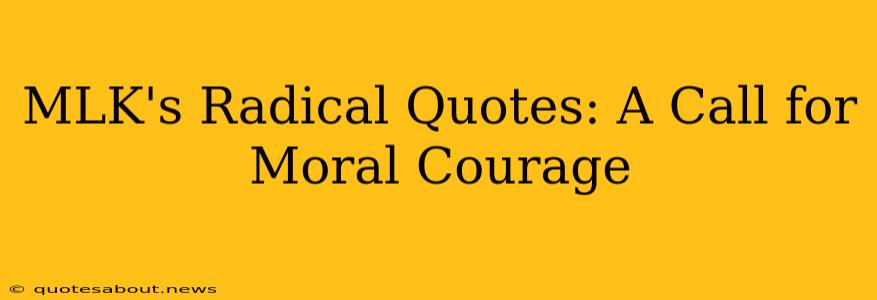Martin Luther King Jr.'s legacy extends far beyond his iconic "I Have a Dream" speech. His powerful words, often radical for their time, continue to inspire and challenge us to confront injustice and strive for a more equitable world. This exploration delves into some of his most potent quotes, examining their context and enduring relevance in today's society. We'll uncover the moral courage embedded within his messages and how they remain a vital call to action for all of us.
What are some of Martin Luther King Jr.'s most radical quotes?
This question probes the heart of King's message. While his dream of racial equality was central, his methods and critiques often pushed boundaries. Some of his most radical quotes challenged not only segregation but also the very structures of power and the complacency of those who stood idly by. Quotes like "Injustice anywhere is a threat to justice everywhere" and "Our lives begin to end the day we become silent about things that matter" are examples of this radical approach. They moved beyond localized struggles, advocating for a global commitment to justice and highlighting the moral responsibility of individuals to speak out against oppression, regardless of personal risk. These aren't simply calls for peaceful protest; they're calls for a fundamental shift in societal values and individual conscience.
What was the context of MLK's radical statements?
Understanding the context is vital to appreciating the radical nature of King's pronouncements. He delivered many of his most challenging speeches and wrote his most provocative letters during times of intense social and political upheaval. The Civil Rights Movement faced significant opposition, including violent resistance, systemic discrimination, and legislative hurdles. His "Letter from Birmingham Jail," for instance, was written in response to criticism from moderate clergymen who deemed his actions too confrontational. In that letter, he eloquently defends the necessity of nonviolent direct action, arguing that waiting for justice through legal channels alone was not only impractical but morally unacceptable in the face of persistent oppression. This context highlights the urgency and necessity behind his bold statements.
Why are MLK's radical quotes still relevant today?
The relevance of King's radical quotes persists because the fight for justice is far from over. While significant progress has been made since the Civil Rights Movement, systemic inequalities persist in various forms—racial, economic, social, and political. King's words serve as a stark reminder that complacency breeds injustice and that silence in the face of oppression is a form of complicity. His call for moral courage transcends specific historical contexts; it's a timeless imperative for all who seek a just and equitable world. His quotes offer a framework for understanding and addressing contemporary challenges, reminding us that true progress requires not only legal reforms but also a fundamental shift in hearts and minds.
How can we apply MLK's message of radical love and nonviolent resistance in the modern world?
Applying King's message in the modern world requires understanding that "nonviolent resistance" isn't passive compliance. It's a strategic approach requiring deep moral commitment, courage, and skillful organization. It necessitates a proactive engagement with systems of oppression through peaceful yet assertive means – boycotts, civil disobedience, and sustained advocacy. His "radical love," often misunderstood, isn't sentimental weakness but rather a transformative power that compels us to see the inherent worth and dignity in every human being, regardless of their differences. This necessitates confronting our own biases and actively working to dismantle systems that perpetuate inequality.
What makes MLK's words so powerful and enduring?
The power and endurance of King's words stem from their profound moral clarity and unwavering commitment to truth and justice. He eloquently articulated the universal human longing for freedom, dignity, and equality. His powerful rhetoric resonated deeply with people across different backgrounds, uniting them in a shared aspiration for a better world. Furthermore, his emphasis on nonviolent resistance offered a morally compelling alternative to the pervasive violence and hatred of his era, demonstrating the possibility of overcoming oppression through peaceful means. This combination of moral conviction, powerful language, and effective strategy explains the ongoing impact of his legacy.
This exploration into some of MLK's most radical quotes reveals not only his prophetic vision but also the continuing relevance of his message. His words remain a powerful call to action, urging us to confront injustice wherever it exists and to embrace the moral courage necessary to build a more just and equitable world for all.

